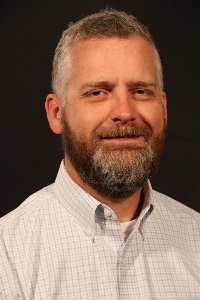All Science Is Deniable
- Dr. Benjamin J. Williams

- Jul 6, 2018
- 4 min read

My first crush was science. I fell completely in love with her at an early age, and it wasn't until I earned my degree in Astrophysics that the spell was shattered. I still adore science, but the naive expectation of certainty which drew me into her embrace has long since passed. Today my appreciation of science is less adolescent and more gray-haired. Less honeymoon and more like a long marriage full of flaws and calmer devotion. Science and I sit up late doing crosswords these days. Less flirtation and more substance.
Perhaps now you can understand my grumpiness when I read influential Christians talk about science as if it were the lone voice of certitude in our world.
Joel Houston, of Hillsong fame, recently gushed on Twitter, "Evolution is undeniable." His tweet sounds a bit too much like a well-known quote from the ever uncareful Neil deGrasse Tyson: "The good thing about science is that it's true whether or not you believe in it." Science is just there, a brute fact to be accepted.
This is the philosophical equivalent of a candy heart reading, "Be Mine."
The two quotes demonstrate a singular and unfortunate misunderstanding of science.
Evolution Is Deniable
Let me first explain what I do not mean when I say that evolution is in fact deniable. I do not mean that Evolutionary models are deniable because of that video your youth minister showed you one time or because of that tour your family took in the Creation Museum. Evolution is not deniable because locked away in the closets of atheists are innumerable counter-facts which are being nefariously hidden from the public. Nor do I mean that evolution is a "theory" and therefore uncertain, whereas the important stuff like gravity gets to be a "fact." No, evolution is deniable on principle.
Evolution is deniable precisely because it is science. All science is deniable.
That is how science works. To quote astrophysicist Ethan Siegel,
You've heard of our most significant scientific theories: the theory of evolution, the Big Bang theory, the theory of gravity. You've also heard of the concept of a proof, and the claims that certain pieces of evidence prove the validities of these theories. Fossils, genetic inheritance, and DNA prove the theory of evolution. The Hubble expansion of the Universe, the evolution of stars, galaxies, and heavy elements, and the existence of the cosmic microwave background prove the Big Bang theory. And falling objects, GPS clocks, planetary motion, and the deflection of starlight prove the theory of gravity. Except that's a complete lie. While they provide substantial evidence for those theories, they aren't proof. In fact, when it comes to science, proving anything is an impossibility.
Science works on the assumption that all models of reality, no matter how prevalent or substantiated, are tentative and tenuous. In fact, the most exciting moments in the history of science have all been from someone questioning an unassailable idea. Galileo questioning Aristotle. Bohr questioning Einstein. Einstein questioning... well, everyone. Every major scientific breakthrough represents a willingness to believe that everything we "know" might be false.
Someone will rewrite the current model of Evolution, just as the current model is a rewrite of Darwin's original. I don't know if what comes next will sound more or less like Genesis, but there will be a "next." The fallacy here is not in admiring science - a vice I share - but rather in letting science's current mood drive the interpretation of Scripture. This is based on the false assumption that this moment in science is more reliable than historic biblical interpretation.
Reality Is True
Likewise, Tyson's assertion that science is true regardless of your belief misses a critical distinction.
We should not be surprised by the mistake given that Tyson has so brazenly mocked philosophy's concern for definitions. In one podcast a couple of years ago, he remarked that philosophy "devolves into a discussion of the definition of words. And I’d rather keep the conversation about ideas." I cannot imagine a universe where that pair of sentences makes any sense... but I digress.
What Tyson should have said is that reality is true whether you believe in it or not. Science is the human experience of reality, and the result of our cognitive powers applied to reality. Science is not reality. Science applies a mathematical model to reality based on assumptions about what variables might matter to our questions and even what those variables might be. Those assumptions are creative leaps, guesses at the underlying truth and how to express it. Imagine it as passing notes to the universe asking for a date. We sit back afterward and nervously wonder what her answer might be. Is the speed of light constant? Check "yes" or "no."
Reality is undeniable, and science often depicts reality in useful ways. However, Christians must never confuse the usefulness of science with certainty. We need to grow up a bit and enter a more mature relationship with science. Appreciate her, but do not idolize her. Don't take everything at face value. Stop with the cheap flirtation and instead appreciate how little we know about her.
Ben Williams is the Preaching Minister at the Glenpool Church of Christ and a regular writer at So We Speak. Check out his new book Why We Stayed or follow him on Twitter, @Benpreachin.
Like the content? Support the site and get more at patreon.com/sowespeak!







Comments